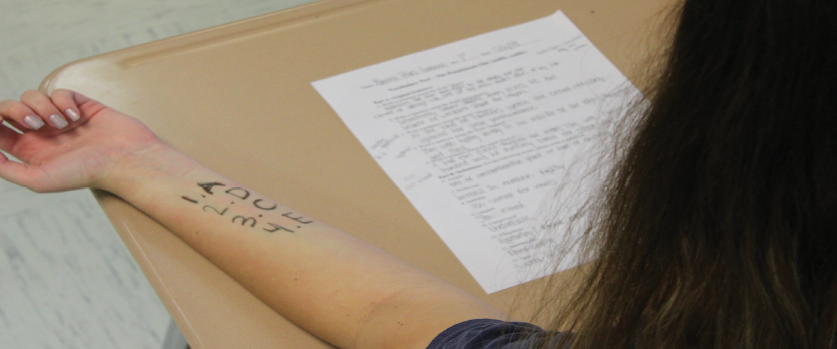You are sitting at your desk, sweating through your shirt as the teacher passes out the test. You didn’t have time to study last night and you need a good grade. You take one look at the questions and recognize absolutely nothing on it. You start to freak out, so you decide to take a glance at the person’s paper sitting directly to the right. After all, it’s not going to hurt anybody. At least, this is the perspective of some students.
Cheating is a problem that occurs at every level of education all over the world. According to a survey done by The Josephson Institute Center for Youth Ethics in 2017, 59 percent of high school students admitted to cheating on a test in the past year. This has become an issue at Northwood as well.
“For every test you take, I would say at least three people cheat on it,” an anonymous senior said.
Tests are not the only thing that students at Northwood cheat on. Homework, classwork, projects and other assignments can be cheated on as well. Many students, however, still do not take part in cheating activities.
“No, I do not [cheat],” an anonymous junior said. “I work hard for my grades, so there is no need for me to cheat.”
Others are very open about their cheating habits.
“Oh, 100 percent [I cheat],” an anonymous senior said. “Almost every test, assignment, anything. Cheating is just a form of people beating the system—it’s success, it’s people doing what is necessary to get a good grade.”
Teachers and students can have different interpretations of what they consider cheating to be.
“Cheating can be in degrees,” social studies teacher Holly Roper said. “It can be copying homework because you didn’t do it, or it could go to something much more complicated and serious, like intentionally writing down answers or information to be used on a test or larger exam. Everything between that falls into cheating as well.”
Math teacher Jack Hunter has encountered countless episodes of cheating in his classes.
“Every year, every semester and [in] almost every class, I have cheating incidents,” Hunter said.
English teacher Jill Jackl believes part of the reason for this is the use of technology.
“I think that cheating with the use of the internet has become almost a paradigm of public education,” Jackl said. “Shared Google docs, the ability to just look something up instead of just learn a concept, to think you can just separate one from the other in this modern teaching form is totally a ludicrous thought.”
Spanish teacher Christopher Lupoli also believes that technology has added to the issue of cheating, and he discourages the use of translating applications in his classroom.
“What I want my students to do is demonstrate what they are learning,” Lupoli said. “Not what a computer tells them is correct Spanish. I expect them to make mistakes, I want them to show me what they are learning, and technology like Google Translate does the exact opposite.”
Jackl also thinks that part of the blame can be put on the methods of teaching.
“The biggest problem lies in the assignments that teachers give,” Jackl said. “If you are just going to be using a test you have been using for the past 15 years, guess what, that bad boy is online somewhere. Teachers that take their lesson plans off of the internet have to understand that their student can also go [online] and find exactly what they are looking for. The problem is not just in the student who has also been taught since the onset of internet and smartphones that [if you] don’t know answers, you just look for answers. So basically, to stop the cheating that we have today, you have to alter the way our assignments are. You cannot just have them look up and regurgitate. It’s the nature of the assignment, it’s the nature of the beast. You can’t slay the cheating beast now, so you have to find a way to create alternative assignments that will impede stealing someone else’s work.”
Lupoli believes students are responsible for themselves and need to take action instead of resorting to cheating.
“I think students don’t speak up when they should,” Lupoli said. “Sometimes students, instead of putting effort into it or asking for clarification or help, they make excuses and they cheat. There are times in life when you are not going to do well and there are times in life where you need to ask for help, and sometimes students don’t speak up, and then they justify their dishonesty wrongly.”
Cheating can be a complicated issue, and in some cases, students believe that it can be warranted.
“[Cheating is warranted] maybe when your teacher doesn’t give you any of the materials to prepare for an upcoming test and you have no clue what it’s on,” an anonymous senior said. “And you need to pass to keep going and keep your grades up. Cheating is still bad—just because some cheating can be justified doesn’t mean it’s good.”
Hunter can also understand why some students decide to cheat.
“Everybody has a breaking point,” Hunter said. “You don’t consider yourself a murderer, but is there a point where you would kill to defend yourself or protect your family or someone else who is vulnerable? There is a point where everybody would say, ‘This is so important to me that I would break my moral code,’ and I think that’s what happens with cheating…. I understand motivations: they just want to get good grades and they feel that is their best hope for getting a good grade. I have sympathy for them, but I still try to stop the behavior when I can, in a healthy way.”
Roper, on the other hand, does not believe any form of cheating can be justified.
“I don’t think [cheating can be justified],” Roper said. “I think there are a lot of avenues you can take in order to make yourself feel better about your performance, and [by cheating], you are really cheating yourself out of a grade, you are possibly setting yourself up for major consequences and you aren’t really learning anything.”
Students have different reasons and motivations for cheating themselves. Some students believe other students cheat because they see others doing it.
“Everyone wants to have a good grade, and if one person sees someone cheating, they say, ‘Why not cheat?’ themselves,” an anonymous senior said. “I think the people at the top of our class cheat because they want to have the best grades, and I think the people below them cheat as they see the best are doing it, so they think it’s an easy way to the top.”
Others see it as a result of the stress high school puts on the students.
“Either the person didn’t prepare, or they feel like they need to do it to get good grades,” an anonymous junior said. “School puts a lot of stress on students, and for many, cheating can act like a get out of jail free card.”
Jackl believes there are two main reasons that students cheat.
“Number one [it’s] laziness, and number two [is] the self imposed anxiety,” Jackl said. “GPAs are inflated, the whole systems inflated, and it is so [focused on grades] that it creates this stress and this anxiety that is hard to lather if you are a student.”
Lupoli believes that those who cheat now will have it come back the bite them in the future.
“I can say that people who are dishonest now will suffer consequences late in life,” Lupoli said. “Dishonest people will eventually meet their fate, and if it is not brought to their attention now, at some point it will be.”
Jackl has one last message for potential cheaters.
“Cheating is a risk you take, like speeding or doing something illegal,” Jackl said. “If you get caught, you have marred your reputation. And it’s hard to get that reputation back once you are labeled a cheater, so be careful before you make that choice.”
– By Davis Palermo



